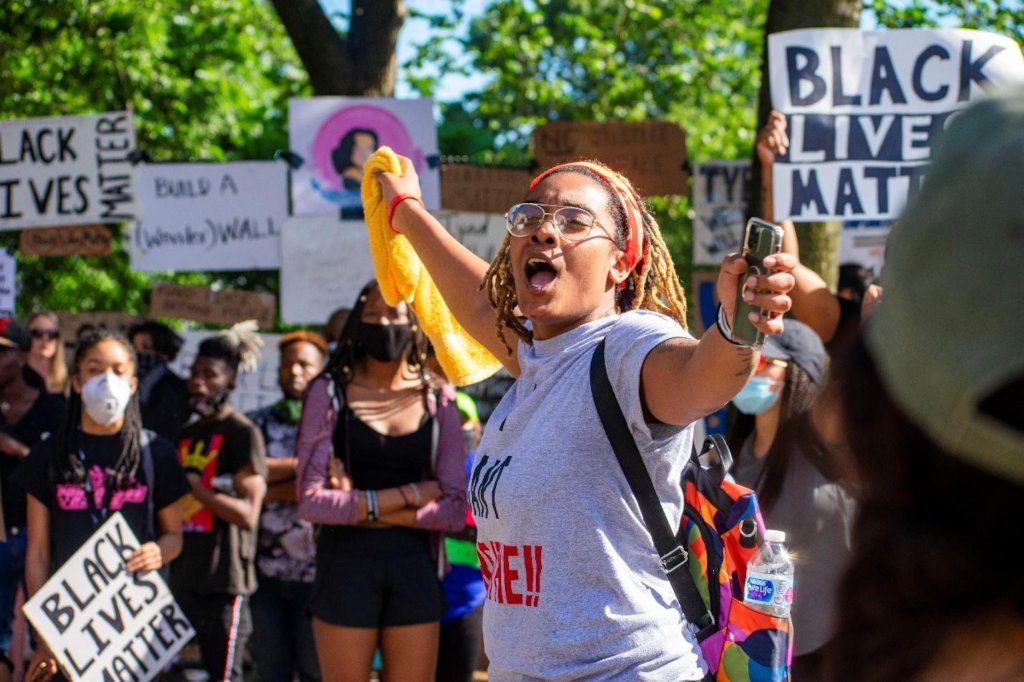By Jacqueline Skalski-Fouts | HAF Intern
Last Sunday I attended a protest for the Black Lives Matter movement in downtown DC. Despite the heat, hundreds of young people, most wearing masks (to limit spread of COVID-19) and carrying home-made signs, crowded the streets, which had been blocked off by police to stop traffic and make it safe to march peacefully. Along the sidewalks, families held signs in the shade, children on their parents’ shoulders, and people handed out water bottles and snacks.
The march began at Dupont Circle where Christele, who organized the event, spoke of the injustices against black people throughout the United States, and of the intentions of the march. She demanded change for the DC police department, including immediate jailing of officers who kill innocent people, reforming police training, and providing compensation to the families of the three recent victims of police brutality at that time—George, Ahmaud, and Breonna.
After a short introduction to inspire the crowd, which included a performance by a local choir group, the march headed towards the White House, where protestors stalled, chanting slogans like “say their names” and “enough is enough.” A shrine of colorful papers, depicting images of people killed by police and some inspiring words, flowed gently in the breeze along the fence.
This is a movement that has captured not just the United States, but has made impressions on countries around the world. People are protesting in London, Berlin, Paris, and Sydney—demanding justice and an end to police brutality.
I think there is something inspiring in the way people can come together, the way someone in-need is taken care of, the way society embraces interdependence, especially at a time when we are forced to accept our own vulnerability under the context of the COVID-19 pandemic.
I saw this sense of solidarity best when everyone took a knee on the hot asphalt in remembrance of the death of George, and a woman to my left offered me the end of her scarf, which she laid on the ground to protect our knees from burning. And maybe this is what it means to be part of something—a community, a society, a movement. It was Margaret who explained that the most important evidence of civilization was a broken and healed femur, because someone had stayed, tended to, and defended the one who was injured. The foundation of human connection is empathy, the inclination to protect. That was the most important and defining aspect of community, not the creation of clay pots or tools carved from rock.
Morocco is a good example of successful multiculturalism, where Amazigh and Arab, Muslim and Jewish, Mediterranean and African cultures coexist in relative harmony, yet similar outbreaks of anti-discrimination movements have centered around the Amazigh people, who make up 40% of the nation’s population. With the adoption of a new constitution in 2011, Tamazight (spoken by Amazigh) was recognized as an official language, and measures have been taken to include the language on road signs and in academic curricula.
But, in 2016, Mohsin, a fish vendor, was killed after trying to reclaim his confiscated product, leading to an outbreak of protests against social inequality. These protests developed into the Hirak movement, taking place mainly in the Rif region where many Amazigh live, condemning socioeconomic and race-based exclusion, corruption, and unemployment. Protestors clashed violently with police and by 2018, about 400 people involved in the demonstrations had been detained.
“Equality in law alone does not ensure equality in fact.”
These protests follow a similar theme to movements condemning violence against migrants and racial profiling. As irregular migration through the MENA region towards Europe grows, race-related discrimination follows, targeting the nearly 700,000 sub-Saharan African migrants (roughly 2.1% of Morocco’s population) who reside within the country.
Injustices against migrants have been a point of focus for international human rights groups since 2005 when sub-Saharan migrants were killed along the Spanish border in the enclaves of Melilla and Ceuta. Local organizations began campaigning against race discrimination, and in 2014, GADEM introduced a campaign with the slogan “Masmiytich Azzi” (My Name is Not Negro) in an effort to reduce race-related injustices and improve migrants’ legal status, which resulted in the regularization of over 25,000 migrants living in Morocco.
Morocco has since developed several policy initiatives to reduce discrimination, such as the National Action Plan on Democracy and Human, and the Government Plan for Equality. However, as Tendayi Achiume, the special rapporteur to the UN for Morocco, comments, “equality in law alone does not ensure equality in fact.” It is up the people, the young and the old, to progress towards betterment, the first step of which is to recognize and acknowledge the existence of injustices. Our communities cannot grow unless every member is taken care of, unless every member has a sense of belonging and respect—that is freedom.
Perhaps this year, we can take these events as an opportunity to change what has failed us in the past, and rather than dwell on the injustices today, we can progress towards a better tomorrow.
Project reports on GlobalGiving are posted directly to globalgiving.org by Project Leaders as they are completed, generally every 3-4 months. To protect the integrity of these documents, GlobalGiving does not alter them; therefore you may find some language or formatting issues.
If you donate to this project or have donated to this project, you can receive an email when this project posts a report. You can also subscribe for reports without donating.
Support this important cause by creating a personalized fundraising page.
Start a Fundraiser